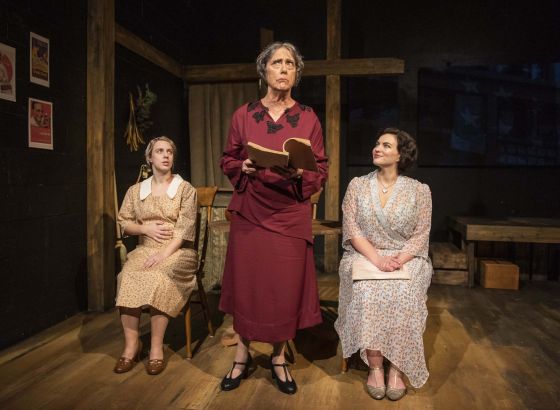
It could be a scene out of a Beth Henley play: townswomen clustered around a kitchen table, intent on the progress of their club chapter's membership drive, the preparations for the upcoming rally and congratulating one another on their newly won right to vote (this is 1925). Gradually, however, we realize that the festival is a cross-burning pageant, the snowy linens being folded are hoods and cloaks, and the recruitment campaign under discussion is in support of the Women's Ku Klux Klan of Mounds, Mississippi. No, this isn't a comedy, no matter how many playgoers may giggle in a futile attempt to dismiss the manifestos promoted by these cheerful, family-focused, pro-feminist( ! ) white supremacist ladies. Muckraker playwright Mary Bonnett's dialogue incorporates language lifted verbatim from promotional literature disseminated by the WKKK—xenophobic missives outlining its goals in no uncertain terms. The agenda of the self-christened "Invisible Empire" was (and continues to be, to this day) founded upon the banishment, by any means necessary, of "alien" tribes threatening "100 percent pure American" values, as practiced by the Protestant Christians of Anglo-Saxon descent comprising its adherents. Dominating the targets of this vilification are African-Americans, but when allies are defined as people like 'us" the catalogue of adversaries quickly grows to include people similar to "them"—in this case, Jews, Catholics, Asians, Mediterranean and Eastern Europeans, Native Americans, urban dwellers, liquor drinkers and interspousal ballroom-dancing. Bonnett could have simply allowed us to stew in horror at this portrait of a subculture still existing today. Instead, she frames it in a narrative featuring two heroes (a journalist from the Chicago Tribune, and a defiant Black female outcast), two martyrs (a clairvoyant orphaned child, and a young wife with a secret, predictable after the first 10 minutes) and two righteous apron-clad villains whose crimes exceed mere alignment on the wrong side of history to encompass lying, cheating, embezzling, betrayal of their comrades, hostile endangerment of strangers, and incitement to cold-blooded murder. Cecily Keenan directs a cast of actors exhibiting not only the courage required to deliberately immerse themselves in the personalities of repugnant characters, but the experience to reach beyond facile stereotypes, creating recognizable individuals governed by motives disturbingly plausible within the flawed cosmology of a parochial demographic riddled by fear and uncertainty. Therein lies the value in Bonnett's mission to "shine bright lights in dark places." Women-as-monsters in Western theater are usually depicted as freaks—psychopathic anomalies, or socially insular cults—but the discovery of pious housewifely citizens proclaiming allegiance to a community, numbering in the hundreds of thousands, advocating the economic ruin or violent extermination of those deviating from their doctrine should alert us to the ubiquity of lofty aims subverted to inhumane purposes.
